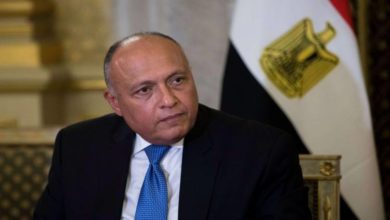Head of Awqaf Authority: One trillion & 37 billion pounds should be freed soon!
4 thousand acres of buildings with comic profits dating back more than 200 years ..?!

In his dialogue with Day 7, the former head of Endowments (Awqaf) Authority, Engineer Salah Al-Junaidi, reported that “Endowment House” is a cynical word that a man threatens to leave his wife, neither she is married, nor she is free according to the divorce law that separates the two parties to restore freedom. This sarcastic case is derived from some conditions of “endowment funds” and a translation of its status. It is a monopoly money, or no endowment dispose of its assets that have been damaged by the factor of time generating little income, and the “Endowments and their Authority” refuse to dispose them and buy assets that generate high income with the same value of frozen assets.
The Ministry of Awqaf possesses approximately 200,000 different real estate units managed through its “Endowment Authority”, as buildings and malls whose units were sold without a share of land to remain frozen that does not generate income and in some cases for about 200 years and the most recent for several decades, it is added To the same case, 4 thousand acres of agricultural land turned into buildings by encroachment during the lawlessness, and paralleled by the houses of monopoly in the villages of the endowment. The same area generates small monthly returns that the ministry has not sold to buy an alternative to it that can accommodate the project of investment and reclamation of the state for a million and 500 thousand acres, or their equivalent According to the general plan of the state. It is equivalent the same state of stagnation of the endowment map, whose assets exceed one trillion and 37 billion pounds, the so-called private endowments administered by the ministry by dividing the low income with the families of those who donated these lands.
The law, which is derived from Islamic Sharia assets, allows for disposing of the endowment with a system called the “allowance”, that is, the replacement of assets in other properties equal to the same value in the hope of a greater return while preserving or increasing the value of the assets. Both are together.
The endowment economy has experts in methods, laws and special procedures in management and disposal, which are summarized in: not to impose assets, and it can be replaced in equivalent terms with the same value and it may be required that it be of the same type as land with land and real estate with a property, and the return is spent in banks 75% of which are spent according to standing conditions, i.e. what stipulates that the donor, who neither he nor anyone else has should change a written condition, most of which are spending on mosques, preachers, education, the poor, the sick, the homeless, orphans and foundlings, and 25% of them are called faces of righteousness, and they are the same as the previous faces, and similar to them like paving a road or, build the country and support every needy person.
The endowment and architectural expert, engineer Salah Al-Junaidi, the former head of the Endowments Authority, suggested raising the value and investment capacity of the endowments according to several procedures that support the beneficiaries and help in building the state within the terms of the endowment, which the state and the administration in the endowments maintain in all levels.
Al-Junaidi said to Day 7, “we are in a golden period, the Head of State and his administration officials know the value of the endowment, and support it as it is the biggest guide to establishing a charitable endowment fund to invest God’s money for the benefit of those who deserve it.
Al-Junaidi explained that the endowment is the result of Egyptian, Arab and Islamic culture, so that there is no old street and no place but with endowments, and that this culture is confined to the old, at a time when it began to spread in America and Europe, and even in Israel, and this culture is an aid to countries in sustaining the needy and the development of things, stressing that the eternal quality of the continuation of the endowment calls us to buy lands in the New Valley and all places awaiting a great future, thanking the President of the Republic for his support the endowment.
Al-Junaidi suggested 3 paths to raise the endowment revenue, the first: the release of private endowments and the delivery of 60% of them to their owners, and 40% of the Endowments sold and converted into agricultural land.
The second parallel track is the sale of real estate land of up to 200 thousand units to the occupants union for these buildings, confirming that they generate billions, including: Downtown Cairo and Alexandria Corniche buildings in light of the price per square meter that equals 300 thousand pounds, the city of flowers in Alexandria, which reaches 20 acres, and the city of journalists that Up to 37 acres, equivalent to 150 thousand meters per square meter, at least 10 thousand pounds, at a billion and a half, and projects such as Sama Aswan on the banks of the Nile, Abdel Aziz Street, and downtown Cairo buildings, can buy agricultural land that can stimulate the state with great profits.
As for the third track, Junaidi proposed selling the aggressed lands, and legalizing the conditions of those who built them, which are more than 4 thousand acres, and the equivalent that they generate cheap entry while equaling billions and buying new agricultural lands that promote land works and state facilities that fall under the activities of land.
Al-Junaidi also proposed the enactment of new legislation to accelerate the release of private endowment property due to its owners and speed up the handover procedures in exchange for the state obtaining 40% of the value of the endowment winnings for bearing the expenses of the procedures, and to resolve them without resorting to lawyers, mediators and judiciary.
Al-Junaidi demanded that the endowment that was named in the name of the Endowment Authority, which is a state-owned administration authority, should be reinstated while the endowment is not public money, so that the endowment would be owned by the ministry instead of the authority, and name the new lands and existing factories in the name of those who donated endowments that would be sold so that their endowment shares would continue until If it changed its place from its old place to a new one.
Al-Junaidi added, in his proposal, that the delay in handing over the civil endowment since the fifties until now made it virtually non-existent against its owners and in the right of the state and beneficiaries, mediators and chanters took on him in previous periods, which called for the formation of the Mehlab committee to limit these dues, with endowments seeking to preserve them.
Al-Gunaidi said the civil endowment is widely spread and its value is estimated at billions and its owners are poor and the aggressors against it or some of it since a time have become rich that necessitates the state to speed up the extradition procedures and release it in exchange for administrative expenses and the expenses of committees and extracting papers at its expense that takes the time of delivery so that everyone may enjoy the good of this property, whether it is the state or the original owners.
Al-Junaidi added that the endowments do not possess these civil parts and take 10% of the quarter for management to look at. They can get the same percentage of the capital and the state gets 30% of the capital in exchange for spending on procedures and solving its problems, and the original owner gets 60% without any attorney They may require half of the wealth and the state is the first of them in the endowment person.
Al-Junaidi pointed out that many of the covetors always wait for these properties, especially in previous periods, while the endowments struggle to preserve them, and their owners suffer from poverty and the first is that everyone cooperates in implementing a law issued in the fifties to hand over these properties, praising the efforts of the endowments and the executive and the Mehlab committee in preserving endowments in light of receiving the situation amid negative accumulations of years.
For his part, Representative Omar Hamroush, a member of the Religious and Endowments Committee in the House of Representatives, said that he is ready to adopt the Al-Junaidi thesis to present it in the form of a law in the House of Representatives on one condition that it does not contradict the endowment condition because the condition of the endowment is the text of a legislator.




